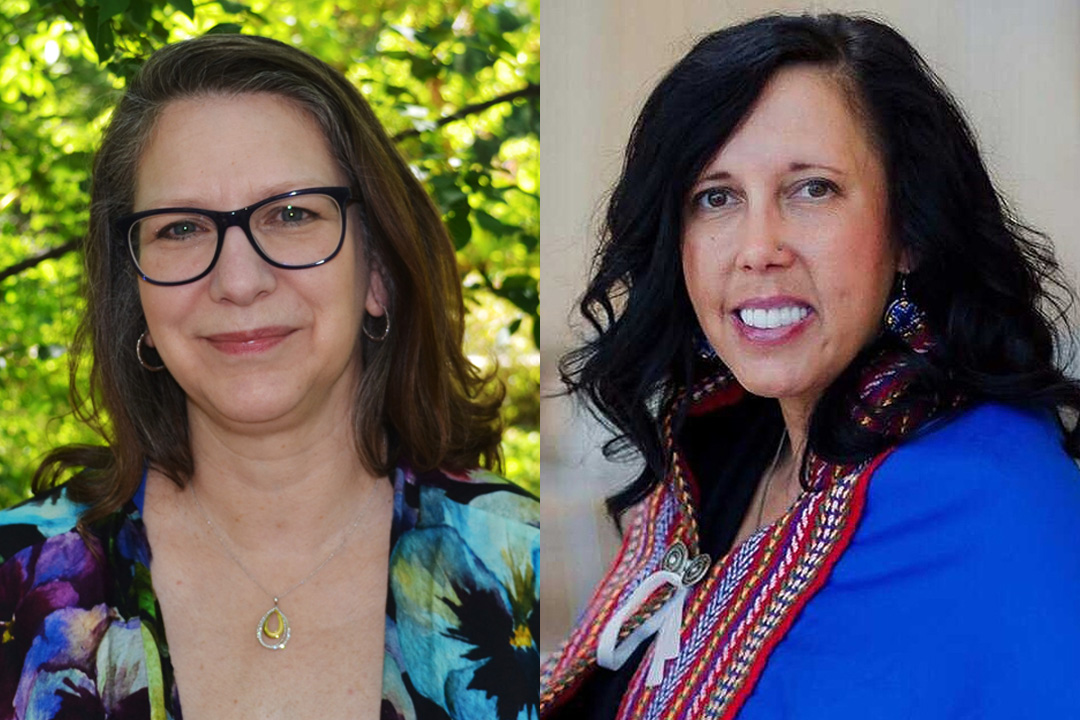
USask faculty recognized for exemplary teamwork
The University of Saskatchewan’s (USask) Office of the Vice-President Research has honoured two recipients, Dr. Pamela Downe (PhD) and Dr. Carrie Bourassa (PhD), and their respective research teams, with the inaugural Publicly Engaged Scholarship Team Award this year.
By Research Profile and ImpactThe award recognizes teams made up of USask faculty, post-doctoral and graduate students, working in collaboration with community partners that have inspired and instigated social action in the community through research, scholarly and artistic work.
In selecting awardees, the selection committee considered the evidence of impact of the teams’ work on social outcomes, the quality of engagement with communities and students in the creation of social innovation, and the contributions of the team to scholarly literature and/or professional organizations.
Both of this year’s award winners demonstrate the important social outcomes that can be found in research work and in partnering with the community, according to letters penned in support of each nominee. The winners were honoured with an online celebration and awards ceremony organized by the Office of the Vice-President Research, due to the current challenges of COVID-19.
Dr. Downe and Prairie Harm Reduction
Downe is a professor in the USask College of Arts and Science in the Department of Archaeology and Anthropology. She has been involved with numerous efforts to publicly engage scholarship in the Saskatoon community, through mentoring and engaging students in community-based academic work and most notably through her long-standing partnership with Prairie Harm Reduction (PHR, formerly AIDS Saskatoon).
“I am most proud of the collaborative teamwork with Prairie Harm Reduction. PHR and I have worked together for over 15 years, addressing some of the major questions related to the HIV/AIDS pandemic here in Saskatchewan,” said Downe. “Ensuring that research is relevant, rigorous, timely, and useful to partnering communities is paramount.”
“Dozens of staff, hundreds of people who access the services, as well as students and fellow researchers have given me the honour of their time, participation, and collaboration.”
As part of her remarks on May 31, Downe thanked current PHR Executive Director Jason Mercredi and former Executive Director Nicole White for their leadership and support, and acknowledged the USask researchers and colleagues with whom she regularly works: Dr. Karen Lawson (PhD), Dr. Sylvia Abonyi (PhD), Dr. Susan Tupper (PhD), Dr. Angela Lieverse (PhD), and Dr. Allison Muri (PhD).
Downe’s main academic focus is medical anthropology and she has completed extensive academic work on infectious disease and epidemic ethnography, pathography, as well as cross-cultural research on maternal health and kin-care.
“I am especially grateful to work in a department that has led the way in advancing interdisciplinary research on infectious diseases through community-to-classroom initiatives in addition to Truth and Reconciliation initiatives,” said Downe.
Downe brought attention to the Saskatchewan HIV/AIDS epidemic through a longitudinal study conducted in partnership with PHR.
Downe’s collaboration with PHR led to the 2021 publication of an ethnographical analysis of urban Indigenous experience and caregiving practices, titled Collective Care: Indigenous Motherhood, Family & HIV/AIDS. The award was given to Downe and PHR in recognition of their accomplishments and contributions to the wider Saskatchewan community through scholarly work.
Dr. Bourassa and team
Bourassa is a professor in the USask College of Medicine in the Department of Community Health and Epidemiology. Bourassa has completed extensive community-based research work focused on Indigenous health and well-being.
“I am honoured and humbled to be a member of this team and to serve Indigenous communities,” said Bourassa. “This award is about service to the community partners that we serve and an incredible team at Morning Star Lodge, including the Elders and Knowledge Keepers that guide the work.”
Bourassa is an administrative leader at the Canadian Institutes of Health Research Institute of Indigenous Peoples’ Health, where she has served as scientific director since 2017. She successfully created and launched the Network Environments of Indigenous Health Research national program, and secured more than $99 million in research funding.
Bourassa demonstrates her significant impact on the wider community along with her research team, specifically in Indigenous Peoples’ health, with a goal of improving and promoting the health of First Nations, Inuit and Métis people of Canada.
“Morning Star Lodge is a mentorship lab started in 2010 at the direction of Indigenous communities,” said Bourassa. “I was asked to create a safe space for both Indigenous communities and Indigenous students who are interested in Indigenous health research. The lab started out in a small space, but we have continued to grow and develop relationships with many communities and partners.”
In their decision, the awards selection committee specifically highlighted Bourassa’s significant contributions and impact made with and for Indigenous communities, the breadth of her academic achievement and early career success, and her national reputation.

